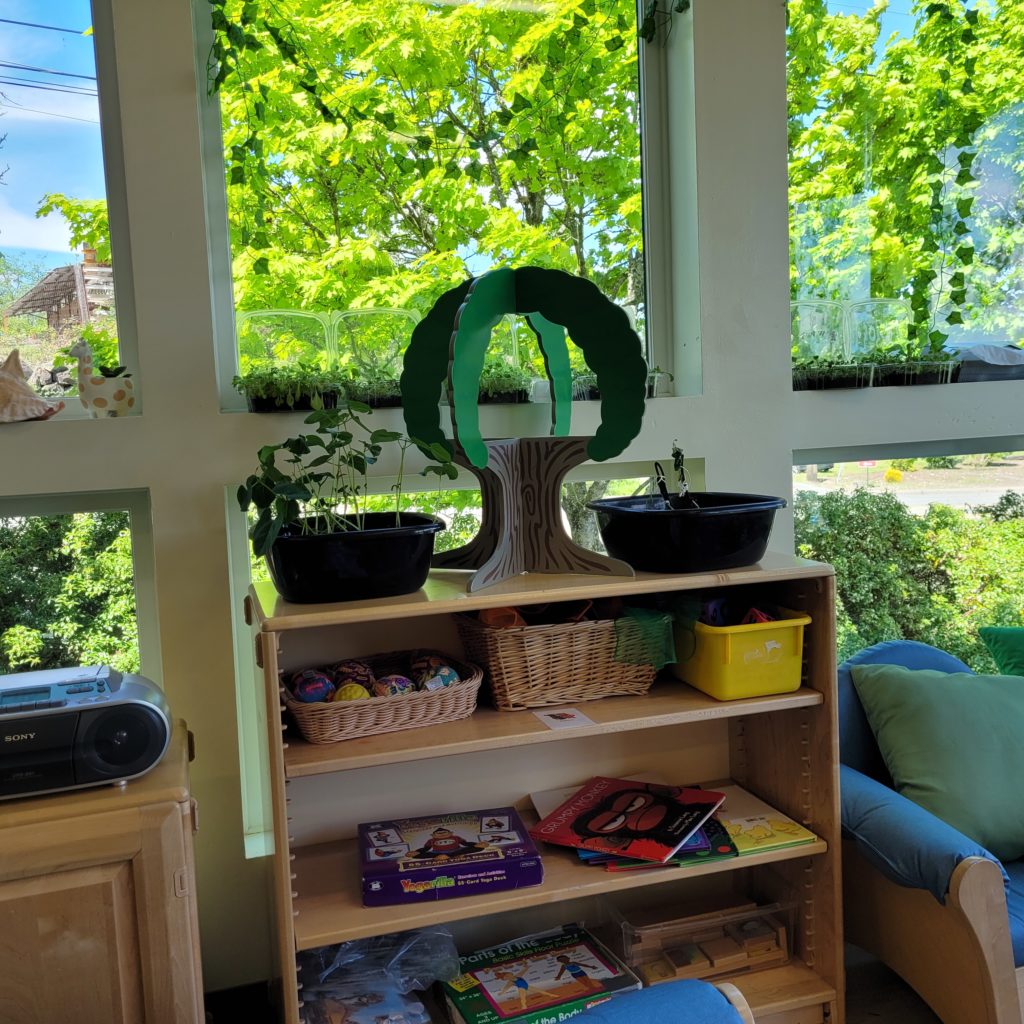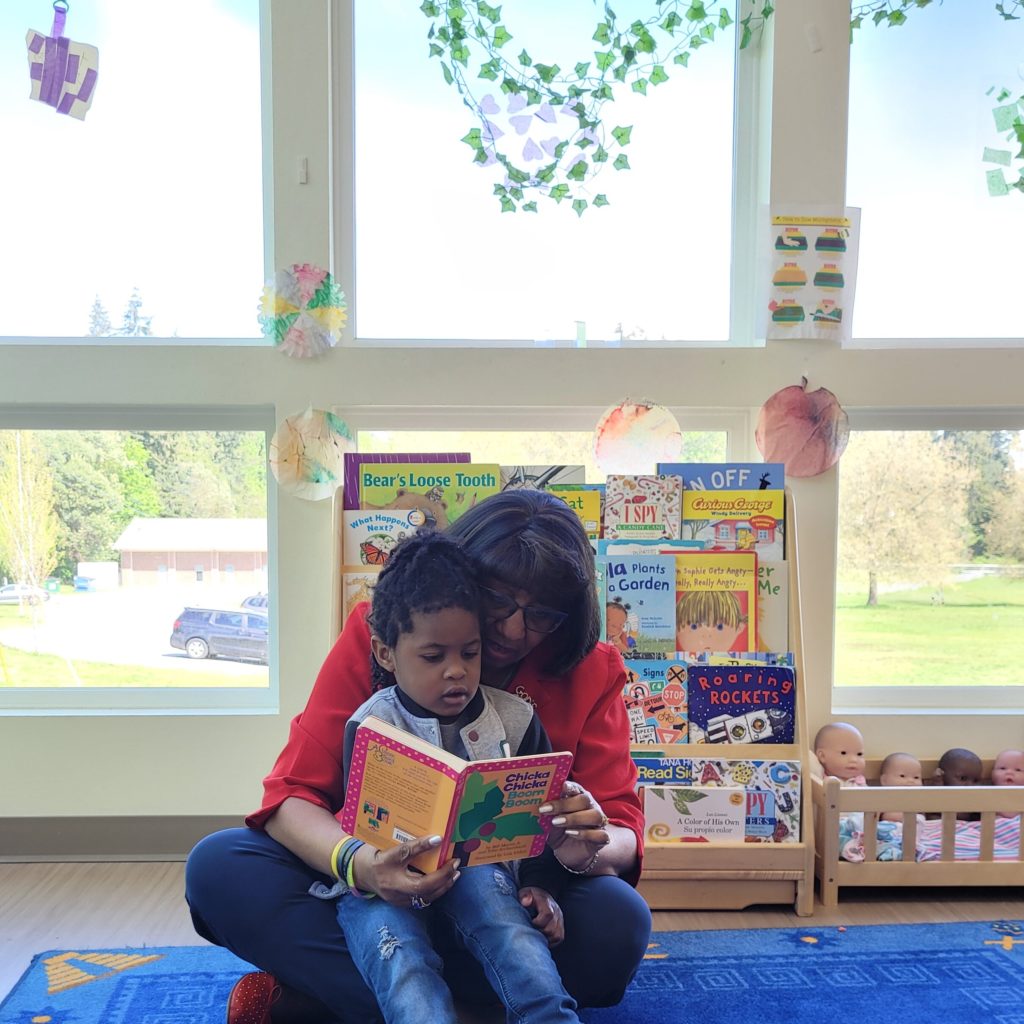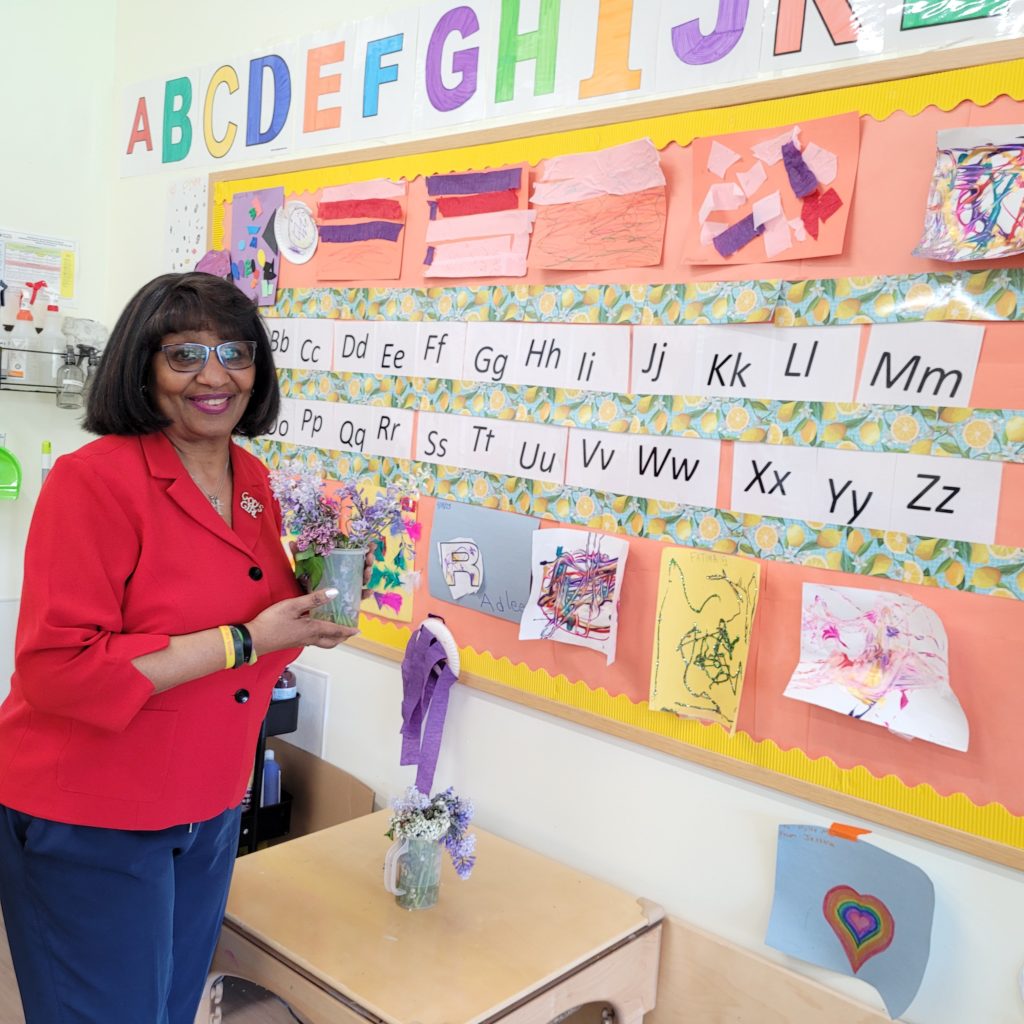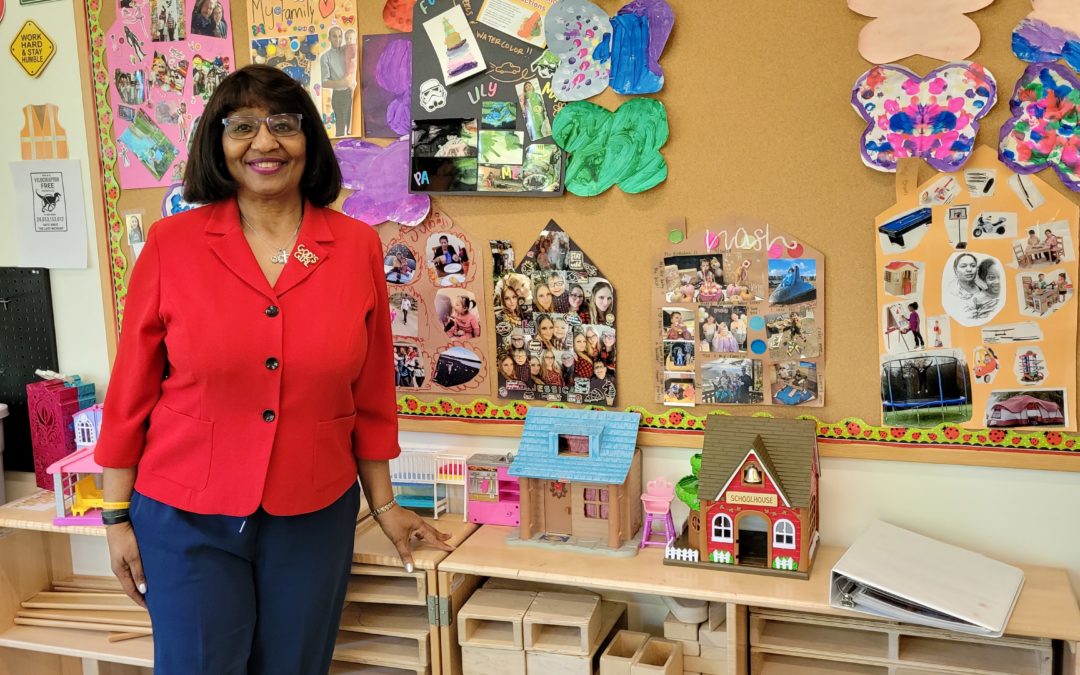A: It is a pleasure to be here with you, Miss Edith. I am glad to meet a person who contributed almost all of her life for Early Learning in general and KCR Early Learning. I think of Early Learning as one of the most important programs that KCR provides because it educates future generations. So, I would like to start with a simple question. How did you come in contact with Early Learning and what inspired you to start working in the Early Learning sector?
Edith: When my daughter, because I’m a single parent and my daughter started in preschool, and she had this teacher named Rosemary who taught her.
And she was always telling me that you could probably teach, and I was always saying No, I don’t think I want to do that. I wanted to be an English teacher when I was going to college, but it didn’t quite turn out that way. So as my daughter was going to school, she kept talking to me about it.
So, when my daughter graduated from preschool, I started, and once I started volunteering, that gave me an outlook of maybe I should go ahead and do this.
But prior to that, I was the president of her classroom, and they have presidents like over the classroom and things like that – it is a parent thing. And so, I did that for a year. And then I was asked to be on Policy Council after that. So, I was on the policy council for three years. I did that from there and than my son went to preschool.
I was still involved at that time. I volunteered for about two years. And then a position came open to be a teacher’s assistant. Well, I didn’t quite get it.
But then the following year I put back the effort and I got it. And from that point on, I’ve been there since.
A: That is so nice. So, how many years of experience do you have in educating kids in our community?
Edith: To put it in the numbers, I would say over 40. Wow, let’s say over 40 because with the volunteering and the Policy Council and all the things involved in. Yeah, I would say it’s over 40 years.
A: I would like to ask you a thought-provoking question that deviates from the typical interview discourse: Did the children you worked with teach you something?
EDITH: That’s a good question.
During my work at Naval Avenue, which spanned eight years, I had the privilege of working with children with special needs, constituting 65% of our student population. This experience provided me with invaluable knowledge and insights into various aspects of caregiving. I learned a multitude of skills, ranging from assisting children with feeding tubes to supporting those who relied on crutches or were unable to walk altogether. Despite their challenges, these children taught me immeasurable lessons.
One particular child named Hunter, who was wheelchair-bound and non-verbal, left an indelible mark on me.
We would sway together in sync whenever music played, creating a connection that transcended words.
My proximity to these remarkable children allowed me to forge deep relationships with them.
I never approached them with pity but instead sought to understand and learn from their unique perspectives. A fellow teacher specializing in special education imparted a valuable piece of advice: “Do not focus solely on their physical or cognitive limitations. Extract knowledge from what they can demonstrate and offer.”
Over the course of eight years, I acquired comprehensive knowledge on how to provide optimal care for these exceptional individuals. I familiarized myself with their needs, such as deciphering the reasons behind their tears and avoiding unnecessary pity. My time at Naval Avenue was an immersive education, enabling me to gain a deep understanding of the special needs community and kids.

Let me tell you another story from the Early Learning days.
When the computer comes out, you know, I’m not really that computer savvy. I wasn’t really computer literate at the time, and I had a set of twin boys in the classroom. I remember it so vividly as it happened yesterday. There was a task that I needed to do on a computer. And these boys at four years old taught me how to complete that task and actually really use the computer the correct way. It was amazing.
Kids taught me many things during my experience. I have so many things. Let me tell you something about the art they make.
Like, if they’re drawing something, I see something different and they say: No Miss Edith, this is what this is.
I am fascinated by their imagination. So, they taught me that, you know, what we see is like, we’re not sure what it is, but what they see is the beauty in it.
So, they taught me how to see the beauty in what they do and in different things in life. It’s not what I see, it’s what they do.
They have taught me so much, friendship, you know, how they create bonds together.
As an educator, I have come to understand the role we play in facilitating friendships among children.
It’s fascinating to observe how they naturally gravitate towards one another and form connections.
As teachers, we sometimes need to take a step back and simply observe their interactions. This aspect of their development has been a valuable lesson for me, especially during my early stages of learning as an educator. I realized the importance of allowing them to gather themselves together and find their own paths in forging friendships.
A: I think these stories truly emphasizes the beauty that lies within the bond between a teacher and their students. In fact, you reminded me one of the things that Picasso said:
“It took me four years to paint like Raphael, but a lifetime to paint like a child.”
Building on this theme of connection, I would like to ask two more questions. From an ethical perspective, do you believe that fostering a strong bond with the students is not only a responsibility but also an essential aspect of teaching in today’s educational landscape? How crucial do you think it is for teachers to prioritize creating meaningful connections with the children they educate?
Edith:
Each year that I teach that the first couple of days of school, they’re going to get to know the classroom. But one of the things I try to build in the beginning is trust.
It is so important that you have trust with the kids, as well as the parents.
You got to earn that trust. You don’t want to overwhelm them right away.
You just kind of kind of like stand back and say, ok, let me see where this is going to go because some people don’t want you to just, you know, just overwhelm them.
So, I wait, I just kind of watch and see where it goes, watch their attitudes, personality. just sit and talk with them a mere conversation you do with a child. You can find out so much from that child. Engaging in meaningful conversations with the children provides invaluable insights. Even during circle time, when the kids gather around, I encourage them to freely express their thoughts on any topic of their choice.
These interactions help me understand each child’s unique personality and preferences.
Actively listening to their voices provides a foundation for effective communication. They are little voices that need to be heard.
That is the best way to prioritize their needs and interests, always placing them first. This approach allows me to establish a strong bond with the children, recognizing what motivates them or brings them down. And so, say, for instance, if one of the kids are upset, I walk over and say, well, I see that you’re upset right now. Do you want to talk about it, or you just want to sit? We can sit together, and we don’t have to say anything.
You’re bonding and it’s very important to bond with the kids no matter what, it’s very important.
And once you get that trust, they’re your friend and that is beautiful.
A: Based on your extensive experience and evident passion for children, I am curious to know your perspective on the vital elements that play a crucial role in educating children and fostering the development of a more promising future generation. Could you please identify two or three key elements in this regard?
EDITH:
The first teacher a child has is their home environment, where the parents, or guardians, assume that role.
We, as educators, come second. However, it can sometimes be challenging because each parent may have different approaches. For instance, a parent might be lenient with their child at home, but that same child could exhibit mischievous behavior in the classroom.
At the end of the day, parents often inquire about their child’s progress, and I believe in providing an honest assessment while maintaining a sense of balance. So, when asked about their child’s day, I might respond, “This morning, we encountered a few hiccups, but this afternoon, they turned it around, and everything went well.”
It’s about striking a balance. Nevertheless, some parents express surprise, saying their child never behaves like that at home. The child’s behavior varies between the classroom and home environment. They learn to adapt and find a balance, behaving differently in different settings.
Our responsibility in the classroom is to help maintain that balance and ensure they are on the right track, although perfection is not expected or attainable.
It’s essential to understand that each child is unique, and some require more effort than others. The toughest ones eventually learn to find balance by observing their peers. Our duty is to do our best in keeping them balanced.
Nonetheless, I strive to provide the best guidance and support in maintaining that balance. Sometimes, despite our efforts, it doesn’t always work out.
However, the important thing is the willingness to make the effort because I have had parents return and express gratitude, attributing their child’s progress to the way I teach. I always humbly deflect the credit, acknowledging that I do what I can with the knowledge and experience I have gained over the years.
I may not have all the answers, but I am dedicated to helping them on their journey. In fact, one of the girls I am currently working with was a former student of mine.
Throughout my career, I have had the privilege of working with exceptional teachers.
Observing and learning from other teachers has been invaluable for me. I absorbed their motivational techniques and teaching methods, combining them with my own style. It’s not about imitating anyone, but rather recognizing valuable aspects and incorporating them into my own approach. Learning from experience has been instrumental in shaping my knowledge and skills, going beyond what textbooks can offer. I am grateful to have the opportunity to continue this meaningful work.

A: Can you tell us something from the days when you were a new teacher and how did you observe?
When I first started my teaching career, I have to admit I was quite scared. Many people approached me with various suggestions and advice, saying things like, “Edith, you should do this” or “Edith, you need to do that.” It became overwhelming, and I reached a point where I felt like I was being pulled in multiple directions. I remember one day, feeling overwhelmed, I went into the bathroom and had a good cry.
To embark on this journey of self-improvement, I decided to take some classes during the summer at my school. Although I didn’t obtain a degree from those classes, I accepted that fact and focused on the invaluable lessons I learned along the way. While many teachers have impressive credentials with advanced degrees, I chose a more hands-on approach. I became a keen observer and learner. I watched and absorbed everything around me, allowing those experiences to shape my teaching style and knowledge base. Today, I am here because of that continuous learning process.
I realized that I needed to find my own path and learn independently.
Like I said, my first few years I learned, and I have to say I learned from the best and I am grateful for that. They were, well, as I say, wonderful people. And so that’s how I picked up from them, you know.
So, I picked up, especially from one person, her name was Rosemary Moen.
One of our sites (KCR Early Learning) is named after her and she was an awesome lady. She was always there motivating me saying: oh come on Edith, you can do it.
She was an awesome educator, funny, yet to the point. I think you need to learn from your mentors and then pass that knowledge on to the kids. Also, it is important to say, that when she taught my daughter in preschool, I was really inspired by her.
It’s important to recognize that not everything you need to know about education can be found in books. Some things can only be truly understood when witnessed and experienced firsthand. This is precisely what I did. Even now, I am still learning, and there is always something new to discover. Each year, I gain unique insights and learn something different from each child.
So, my journey has been a combination of personal growth, practical experience, and a commitment to continuous learning.
A: That’s really inspiring and brings me to another question. What would your advice be for young teachers who have this kind of love toward education, but also maybe struggling because they don’t have the experience?
Edith: My advice to them is simple. Yes, get your degree. After that, go to a class and observe because sometimes if you just go from school to that classroom and there’s no experience, you’re going to struggle. You’re going to struggle big time, especially if you don’t have any experience. The best thing is they have what they call a practical learning experience.
You need to go into that class and watch an experienced teacher because that will help a lot. Now you may not do exactly what the teacher does. You can get some ideas, get what you can get and don’t just go there one time. Go to different teachers continually.
After that evaluate the information and do a summary.
I can use that from there, I can do that from there and then you come into your own, start from that seed and then you can build from that and that’s how I did it.
And then when you do get in that classroom, you’re not going to know everything from the beginning. But you have a start, you’ve seen what different classes are doing. You see what the different teachers are doing even like an art project or a science project or anything, gather your information, get your own seed and then water it from there.
That’s also the best way to learn to think out of the box. Thinking out of the box is very important in Early Learning.
A: Thank you for sharing such heartfelt and insightful experiences. Your description of the educational journey resonates with Isaac Newton’s famous quote, “If I have been able to see further, it was only because I stood on the shoulders of giants.” Given your extensive time spent in Early Learning education, have you ever had moments of regret or second thoughts about your career choice?
EDITH: Absolutely not.
Just knowing that I was allowed to have an impact on them, you know, the gift that’s in me to give it to them, makes me happy.
You know, it’s, it’s, you know, it’s just truly a blessing for me to do what I do every day.
Like I said, I don’t have all the knowledge, so I don’t have all of that, but just knowing that I got to play a part in their lives and make an impact for the better – that’s really important to me.
No amount of money could take that away.


